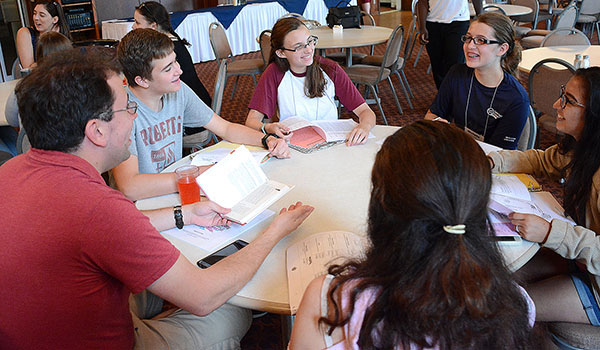Teens and youth leaders discover their strengths
by PATRICK J. BUECHI
Teenage years begin a time of self-discovery, when people learn their likes and dislikes, strengths and weaknesses. It's a period that never really ends. Personal growth leads to new skills and the development of existing strengths. To aid this process, the diocesan Department of Youth and Young Adult Ministry offered a half-day workshop entitled, "Play to Your Strengths," where participants learned how to develop what they were already good at.
Using Gallup's StrengthFinder 2.0 assessment tool, participants learn how they use their talents to work with information, make things happen, influence others, and build relationships. Gallup's CliftonStrengths online assessment measures an individual's specific order of 34 themes of talent. The assessment uncovers which talents one relies on to build relationships, think strategically, execute plans, and influence others to accomplish goals. Basically, it helps people discover what they naturally do best and develop their greatest talent.
The annual Play to Your Strengths event serves as a follow up to the Christian Leadership Institute, where teens learn new skills of communication and teamwork. Not just for teens, parish and campus ministers are invited as well.
"It's for people to learn a little more about their gifts and how they can particularly benefit the Church," said Michael Slish, program coordinator for the diocesan Department of Youth and Young Adult Ministry. "It's really for anybody."
Anna Cappello, a campus ministry leader at Niagara University, already has her future planned out. She wants to be an educator. She found she is a good fit for that position.
"My strengths lie in communication and persuasion of other people. That was really interesting for me because I want to be a teacher," she said. "Knowing that my strengths are persuading people to conform to a certain idealistic standards was interesting because that's what I want to do; sell my ideas to students. As a high school teacher, that's really what your main goal is. I really see that in my career path."
She said the program will help her when leading retreats or pilgrimages or weeklong service trips for NU throughout the year. "We'll know where our strengths lie and our leadership abilities."
For the younger attendees, discovering their strengths can help set a trajectory for their future. Amanda Bergman attended CLI in June. She enjoyed that experience so much, she sought out other opportunities to add to her toolbox.
"I was interested in what my strengths can help me do as a leader. I wanted to understand myself a little bit better," the 15-year-old said. "When I took the test and read over the report, it was really interesting because it explained why I go about my way of doing certain things and it helped me understand some of my beliefs a little bit better."
She earned high marks in responsibility, and can see certain behaviors in herself that reflect that.
"Sometimes I get myself into more than I thought I was going to, but if it's something that I really believe is a worthy cause, I'll get through it," she said.
Eric Muhararani followed a similar path, attending On The Road in July.
"I learned a couple new things about myself. I learned about my gifts and different stuff. I wanted to come here and learn more about myself, get deeper to understanding myself - learn my strengths and my weaknesses," he said.
Daniel Schiffhauer, 16, attended CLI a couple years ago. Now, he's helping his parish, St. Gabriel's in Elma, to start a youth group.
"Through this I found out some of my better strengths are context, analytical, restorative, intellection and competition. (Basically, this means he likes to look at the situation and think of how the various factors will relate to the solution.) The only thing I was surprised at there was restorative (figuring out what is wrong and solving it). Otherwise I though they hit me pretty well, with who I am and what I try to do," he said.
Participants use the StrengthFinders survey to pick the best description of themselves, then examine their top five strengths. Then they talk to other people to learn about their strengths. The day had large group sessions to introduce the idea of what strengths include. The emphasis is knowing ones strengths and using them to their maximum potential. They also discussed how to use strengths as a group and how to use different skills together to make a well-rounded team.
"It's not necessarily getting better at something we don't know how to do. It's about knowing what I know how to do and embracing that," said Slish.




